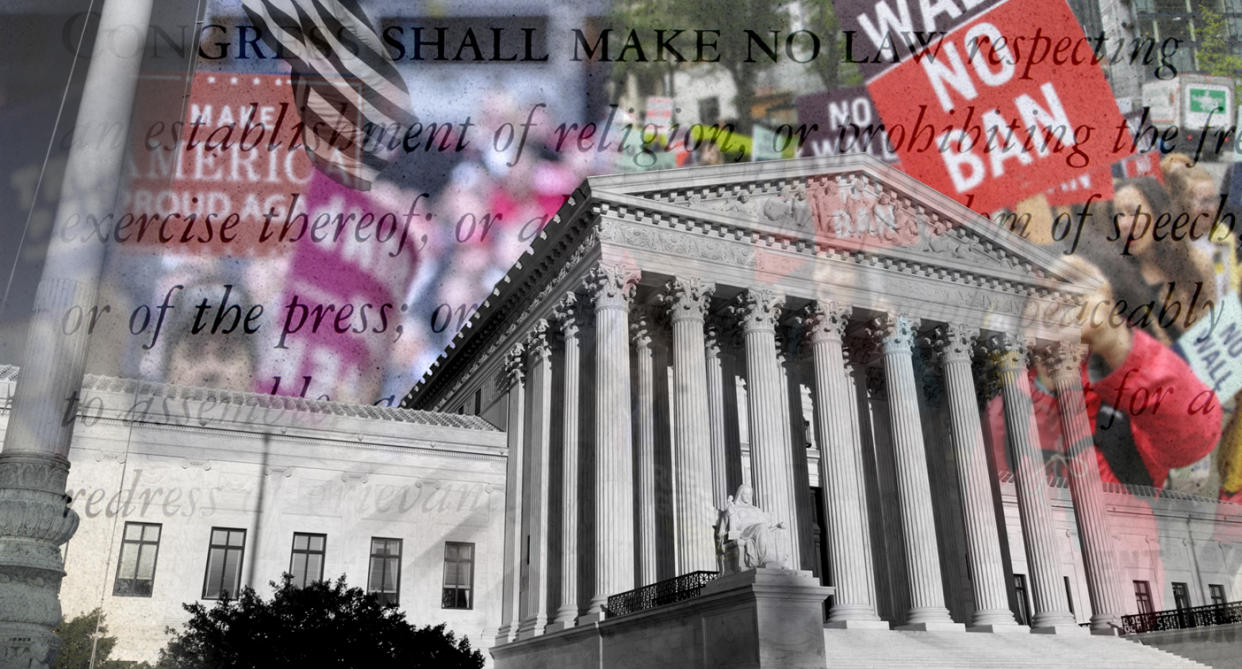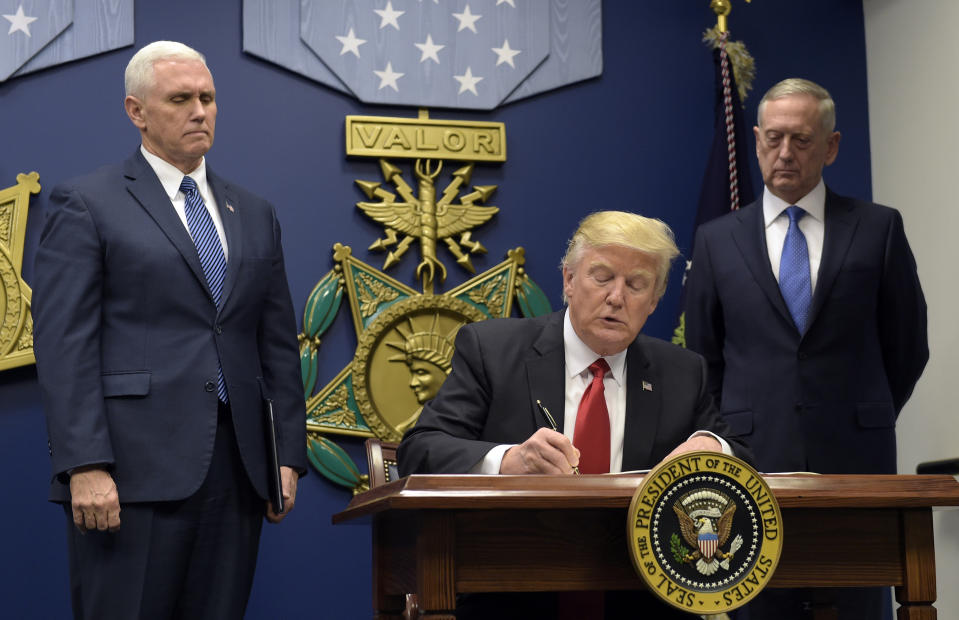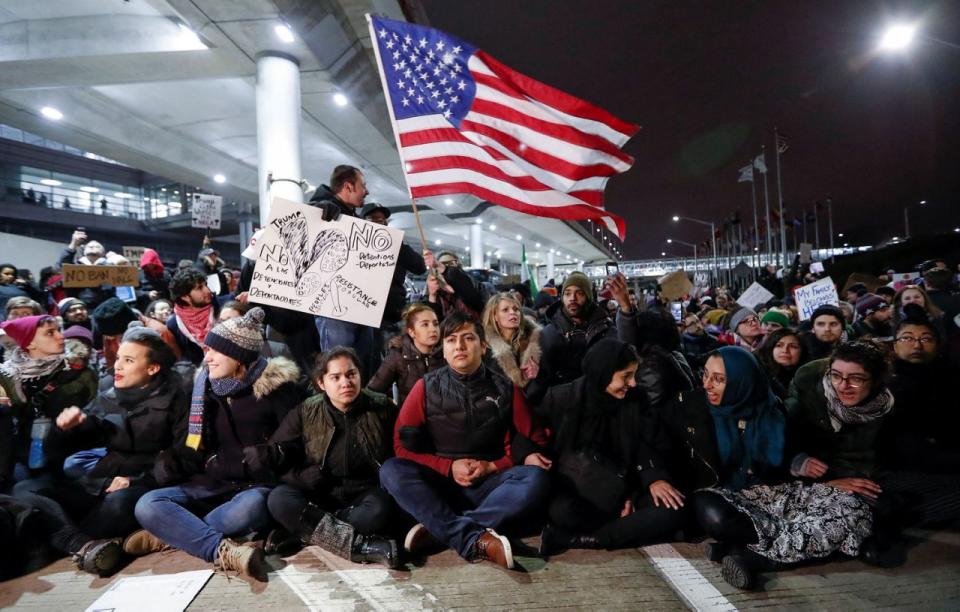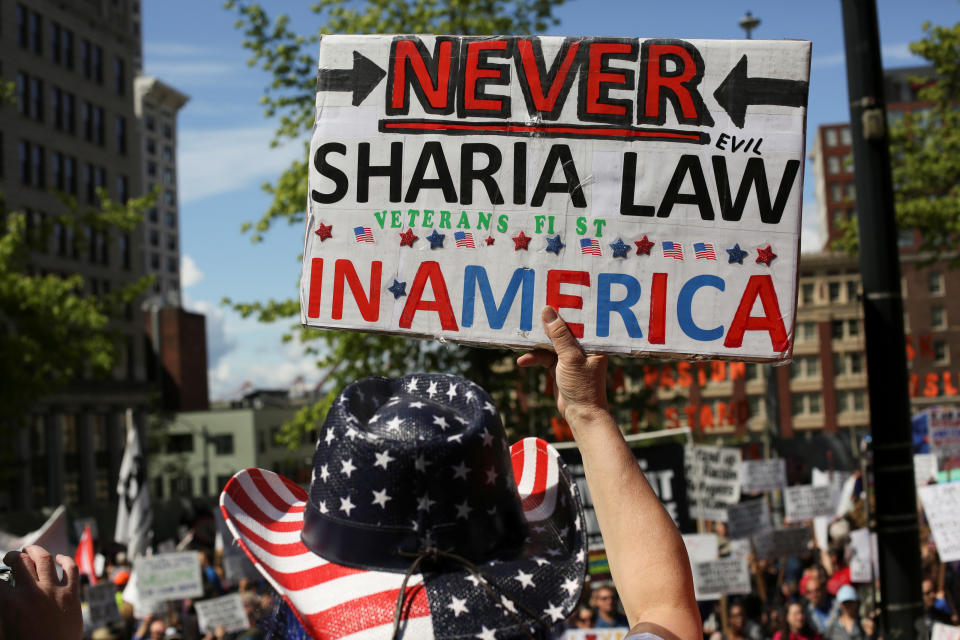Opponents and supporters of Trump's travel ban make their cases ahead of Supreme Court hearing

On Wednesday, the Supreme Court will hear arguments in its last and most highly anticipated case of the current term: Trump v. Hawaii, aka the Travel Ban case.
This case is being heard because of the government’s appeal of several lower court rulings against the president’s orders seeking to ban travel to the United States from several Muslim-majority countries. The third and most recent iteration the so-called travel ban was introduced last September.
Wednesday’s arguments may present to the court some novel questions, including whether retweets may be considered endorsements. The justices will be asked to consider four main issues, two of them procedural: whether the Supreme Court can even hear the case, since it concerns non-U.S. citizens abroad; and whether the lower courts have the power to issue nationwide injunctions against enforcing the ban.
The other two questions consider the merits of the ban, and whether the president acted beyond his authority under the Immigration and Nationalization Act, and if the proclamation violates the establishment clause of the Constitution’s First Amendment, by effectively discriminating against Muslims. The order doesn’t single out Muslims as such, but looming over the arguments is Trump’s proclamation, as a candidate in late 2015, calling for a “total and complete shutdown” of Muslim entry into the United States.

The suit, filed by the state of Hawaii, three individuals and the nonprofit Muslim Association of Hawaii, is the latest twist in the saga of Trump’s efforts to crack down on immigration from a specific group of nations. It began in the first week of his presidency with an executive order titled “Protecting the Nation from Foreign Terrorist Entry into the United States.” That order, which prompted nationwide protests and was quickly blocked by a federal court in Washington State, suspended for 90 days nationals from seven predominantly Muslim countries from entering the country. On March 6, Trump signed a second order with the same title and only slightly different provisions. Again, the order faced immediate legal challenges and was enjoined by district courts in Hawaii and Maryland.
Slideshow: Protests against Trump’s travel ban hit the streets of NYC >>>
In September, the White House tried again with a presidential proclamation that it claimed was written in response to a report by the secretary of homeland security on countries it deemed “inadequate” at sharing information related to terrorism. This time, in addition to blocking entry for most nationals of six majority-Muslim countries, now including Chad, it excluded nationals of North Korea, and some government officials from Venezuela. Unlike the first two executive orders, which were intended to last for 90 days, the September proclamation was essentially open-ended.
As before, the administration was taken to court and the district court in Hawaii issued a preliminary nationwide injunction against the proclamation, which the court deemed had the same flaws as the second executive order. The government appealed to the Supreme Court, which agreed to allow enforcement of Travel Ban 3.0, pending a final ruling.
The latest proclamation may have prompted considerably fewer public demonstrations than the first two bans, but it faces no less controversy. Since agreeing to hear oral arguments in the contentious case, the Supreme Court has been flooded with amicus curiae (friend of the court) briefs from a wide variety of individuals and organizations.

More than 50 such briefs have been submitted in opposition to the ban, including from various civil and immigrant rights organizations, legal advocacy groups and faith-based associations who argue that the ban amounts to governmental discrimination. Briefs filed on behalf of the Japanese American Citizens League, the Fred T. Korematsu Center for Law and Equality and others point to the internment of Japanese Americans during World War II as a cautionary example of what can happen “when vague notions of national security are used to justify vast, unprecedented exclusionary measures that target disfavored classes.”
In addition to a long list of mostly Democratic current members of congress, the court has received briefs opposing the ban from a group of former Republican members of Congress and executive branch lawyers for past Republican administrations, as well as several other conservative and libertarian politicians and commentators.
A brief submitted on behalf of 52 former national security officials, including former Secretary of State Madeleine Albright, ex-CIA director John Brennan and others including ambassadors to the Middle East, disputes the government’s argument that the court should defer to the president’s “foreign policy and national-security judgments” regarding the merits of the ban.
The former officials argue that “the three sweeping Travel Bans that the President has issued over the past fourteen months,” do not deserve such deference, as they are “overbroad, blanket entry bans based on national origin, are not supported by any intelligence … and did not emerge from a careful interagency policy and legal review involving the considered judgment of national security and foreign policy officials.”
“Overwhelming evidence demonstrates that the Proclamation’s overbroad suspension of travel has not only failed to advance our national security or foreign policy interests, but is seriously damaging those interests,” reads the brief, which also urges that government’s national security claim is undermined “when considered in light of the President and his advisors’ well-publicized statements calling for a ‘Muslim Ban.’”
Slideshow: Protests at U.S. airports over travel ban >>>

The ban’s critics also received support from 115 major U.S. businesses (including Yahoo’s parent company, Oath), national labor organizations, and several educational entities including the Association for American Medical Colleges, more than 30 colleges and universities, the American Council on Education and 32 other higher education associations.
The cities of Chicago, Los Angeles, New York, Philadelphia and others also submitted briefs opposing the ban, as did several states, including New York, California, Connecticut, Delaware, Illinois and others
Not all states were in agreement, however. Texas lead a number of other states, including Alabama, Arkansas, Florida, Louisiana and Missouri, in submitting a brief in support of the government.
The court has received about 13 briefs in favor of the ban, from conservative interest groups like the Eagle Forum Education & Legal Defense Fund, Christian-based legal advocacy organizations like the Foundation for Moral Law , which argues that “the travel ban is compatible with the teaching of the Bible on immigration,” and the Immigration Reform Law Institute, the legal arm of the Federation for American Immigration Reform, or FAIR, which advocates for reduced immigration to the United States.

The president’s actions and authority received support from a handful of “national security experts” represented by David Yerushalmi, an attorney and political activist known for driving the movement against Sharia in the United States. The experts named in the brief submitted by Yerushalmi include a number of former government, military officials and one wealthy businessman. Among them is Frank Gaffney, a former Reagan administration official and founder of the Center for Security Policy (CSP) a far-right think tank accused of promoting anti-Muslim conspiracy theories, including a claim that top Hillary Clinton aide Huma Abedin is a Muslim Brotherhood spy and the belief that former President Barack Obama is a Muslim.
Trump’s original 2015 campaign statement calling for a “total and complete shutdown of Muslims entering the United States” cited data released by the CSP that showed “25 percent of [U.S. Muslims] polled agreed that violence against Americans here in the United States is justified as part of the global jihad.” Politifact rated this claim “Mostly False.”
Most supporters of the government position deny that the ban violates the establishment clause, either by arguing that it does not deliberately discriminate against Muslims, or that the order applies to noncitizens residing in other countries and are therefore not protected by the First Amendment.

But one brief, submitted on behalf of several groups including Citizens United, Gun Owners of America and the English First Foundation, among others, doesn’t dispute that the ban “disfavors the Muslim religion.” Nor does it attempt to make the case, advanced by the government, that comments made by Trump as a presidential candidate should be construed as signifying the motivation behind his actions as president.
In fact, “Candidate Trump repeatedly expressed his plan to limit entry into the country from certain majority-Muslim countries and, based on that, the American people voted him into office,” reads the brief, arguing that if the court is to charge the President with discrimination, “it also levels that charge against the American people who elected him, and the judiciary has no role to second-guess the results of an election.”
_____
Read more from Yahoo News:
Comedian Randy Credico says Trump adviser Roger Stone threatened his dog
California leads the nation in sending former inmates to college. Will other states follow?
The Michael Cohen legal sideshow: Gasps, pratfalls and paparazzi
Photos: French President Emmanuel Macron visits Trump in 3-day trip to Washington


